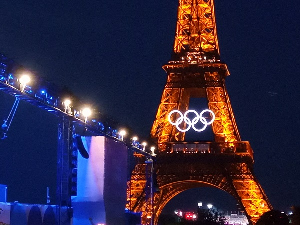We are all aware that climate change poses an existential threat to all life on earth. And we all face new challenges for survival because the earth is likely to cross a critical threshold for global warming within the next decade.
The need therefore arises to fight climate change together. So, the sports world is urging all sports organizations to consider climate change as its biggest foe and take proactive steps to protect the environment.
The Olympics in Paris was spectacular because sustainability has been the major concept adopted in the organization of the games. This is in the bid for Paris 2024 to become the first game aligned with the Paris Agreement on Climate change. During the Paris 2024 Olympics, seventeen (17) new sports organisations joined the Sports for Nature Framework- aiming to help protect and improve the environment.
At an event to celebrate the membership of the 17 new sports organizations in Paris, France in the middle of the Olympics-Marie Sallois, International Olympic Committee Director for Sustainability said: "Paris 2024 has proven that it is feasible – and practical – to implement games that are both spectacular and sustainable."
She emphasized that: "Sport relies on the natural world and has the responsibility to protect it. We are seeing growing commitment and passion from across the sports world, which demonstrates just how far the Olympic Movement has come in its sustainability journey. Through the Sports for Nature Framework, we want to make sure that sports organisations have the right tools and support to take action."
The membership of the 17 new sports entities brought the total number of the Sports for Nature Framework signatories (members) to 76.
Biodiversity protection was a major focus for Paris 2024 organisers, who committed to an “anticipate, avoid, and reduce” approach concerning the environmental impact of the event. Some 95 percent of Paris 2024 venues were already existing or temporary, meaning that new constructions were minimised. For temporary installations, a rigorous approach was developed to assess potential ecological impacts, from the pre-design to the post-games phase.
For example, a rare plant, the “Conopode dénudé”, was protected at the equestrian venue, the Château de Versailles, and temporary installations were carefully set up to avoid damage to meadows and wetlands at the Golf National venue.
The Sports for Nature Framework aims to integrate biodiversity considerations into the planning and operations of sports events, including the Olympic Games. It encourages sports organisations to protect natural habitats, conserve species, and promote sustainable land use.
Launched in 2022, Sports for Nature is a joint initiative by the IUCN, the IOC, the United Nations Environment Programme (UNEP), the Secretariat of the Convention on Biological Diversity (CBD), and Dona Bertarelli Philanthropy.
Opinions of Friday, 6 September 2024
Columnist: Dela Ahiawor















